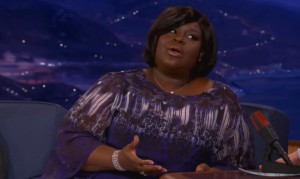Happy
 I’ll start with one of the happiest endorsements for classical music we’ll ever see. Retta, who stars in Parks and Recreation, holds forth with great delight on the Conan show. You have to watch this. Trust me!
I’ll start with one of the happiest endorsements for classical music we’ll ever see. Retta, who stars in Parks and Recreation, holds forth with great delight on the Conan show. You have to watch this. Trust me!
New World
Concerts aimed at new audiences — with paid admission — bring more new people to an orchestra, more even than free concerts do. They also have a younger, more diverse, more satisfied, and more engaged audience than concerts for the normal audience.
Those are some of the findings from a study by the New World Symphony, presented last month at the League of American Orchestras conference. I was there. The presentation was powerful. Some of the conclusions — that alternate formats attract a younger audience — are things we pretty much know. If, like New World, you alternate 20-minute new music performances with DJ sets (that’s one of their alternate formats), of course you get younger people.
But did we know that the people at those performances like them more than traditional concertgoers like traditional concerts, or that they’re more likely to talk about the concert to their friends? This is new. These are important findings. I was impressed (and not least by the savvy and enthusiasm of New World’s presenters).
The link above goes to the PowerPoint New World’s people used at the conference. Worth looking at. One eye-popping detail — for concerts in mostly traditional format, 68% of the audience (you read that right: 68%) is over 65. That’s a big red flag, a warning of trouble coming in the future, unless things change. And New World is making changes.
And finally…
From Seth Godin’s blog:
Instead of working so hard to prove the skeptics wrong, it makes a lot more sense to delight the true believers.
Which — in future of classical music terms — means that those of us who want change should spend less time arguing with those who think we’re wrong. And more time sharing our ideas, and making change happen.
I know that’s not always possible, especially within an institution, an orchestra, let’s say, or a conservatory. To make change, we have to have debate, and some of the debate will be with people who don’t like the changes we propose.
But still we should note Godin’s advice. History is on our side. Change is coming. Much of it, to a greater extent than most people realize, is already here. So the people who oppose us — for all the true passion for classical music that makes them care so much — are fighting a rearguard battle.
Or as someone in the field put it to me a couple of weeks ago: “The train has left the station.” Skeptics, in the end, have only one question they can ask themselves: Do they want to join the ride?

Great video. Right onto Facebook.
An interesting thing happened on the episode of the quiz show “Jeopardy!” (one must always add an exclamation mark after the title or the Estate of Merv Griffin will sue) that aired on Thursday, July 11th: A woman was well on her way to accumulating $30.000 plus that night’s championship due to her knowledge of a variety of topics, including 19th Century literature; she was no dope, and the other two contestants were a few thousand dollars below her accumulated funds at the end of regulation. Then the category for the Final Jeopardy “clue” was revealed as Classical Music. The aforementioned lady BET NO MONEY AT ALL, hoping that the other two contestants wouldn’t bet enough to catch her and presumably because she felt her knowledge of the genre was too weak or maybe nonexistent! The “clue” was about as theoretically easy as any question could be: a composition from 1882 that was based on the tunes “God Save the Czar” and “The Marseillaise”, of course the “1812 Overture”. The other two contestants bet enough to catch and surpass her, while she wrote “I don’t have a clue”. So she walked away NOT with $30,000-plus and a chance to play again, but a paltry $1,000 just because she never considered listening to classical music and learning about it.